仁爱英语七年级上Unit3 单元复习学案(含答案)
- 格式:doc
- 大小:223.00 KB
- 文档页数:13
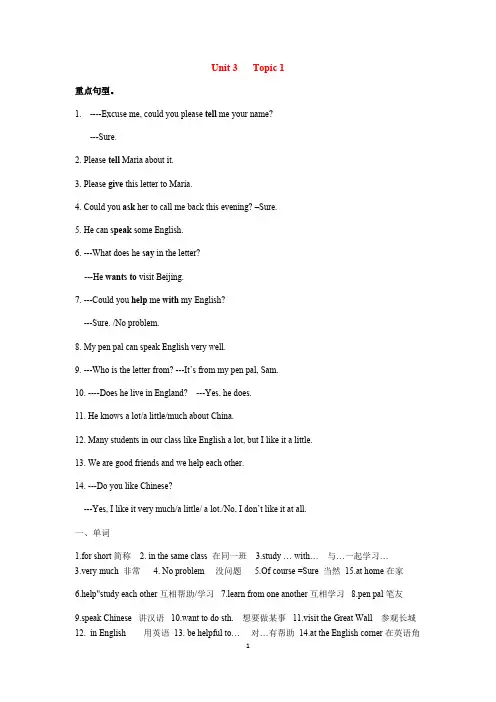
Unit 3 Topic 1重点句型。
1.----Excuse me, could you please tell me your name?---Sure.2. Please tell Maria about it.3. Please give this letter to Maria.4. Could you ask her to call me back this evening? –Sure.5. He can speak some English.6. ---What does he say in the letter?---He wants to visit Beijing.7. ---Could you help me with my English?---Sure. /No problem.8. My pen pal can speak English very well.9. ---Who is the letter from? ---It’s from my pen pal, Sam.10. ----Does he live in England? ---Yes, he does.11. He knows a lot/a little/much about China.12. Many students in our class like English a lot, but I like it a little.13. We are good friends and we help each other.14. ---Do you like Chinese?---Yes, I like it very much/a little/ a lot./No, I don’t like it at all.一、单词1.for short简称2. in the same class 在同一班3.study … with… 与…一起学习… 3.very much 非常4. No problem 没问题5.Of course =Sure 当然15.at home在家6.help"study each other 互相帮助/学习7.learn from one another互相学习8.pen pal笔友9.speak Chinese 讲汉语 10.want to do sth. 想要做某事 11.visit the Great Wall 参观长城12. in English 用英语 13. be helpful to… 对…有帮助 14.at the English corner 在英语角二、句型:1. May I do sth.? 我可以做某事吗?e.g. : May I know"have"ask your name?May I study English with you?May I call you Mike?2.Could you please tell me your name?你可以告诉我你的名字吗?Sure. My name is …当然可以,我叫……2. like … very much " a lot 非常喜欢……like … a little 有点喜欢…not like … at all 根本不喜欢……not like … very much 不是很喜欢……三、语法:(一) 一般现在时1.肯定句: We speak Chinese否定句: We don't speak Chinese.一般疑问句: Do you speak Chinese?回答: Yes, we do. No, we don't.2.肯定句: Mike speaks English.否定句: Mike doesn't speak English.一般疑问句: Does Mike speak English?回答: Yes, he does. No, he doesn't.第二部分基础知识运用(55分)Ⅰ.单项选择。
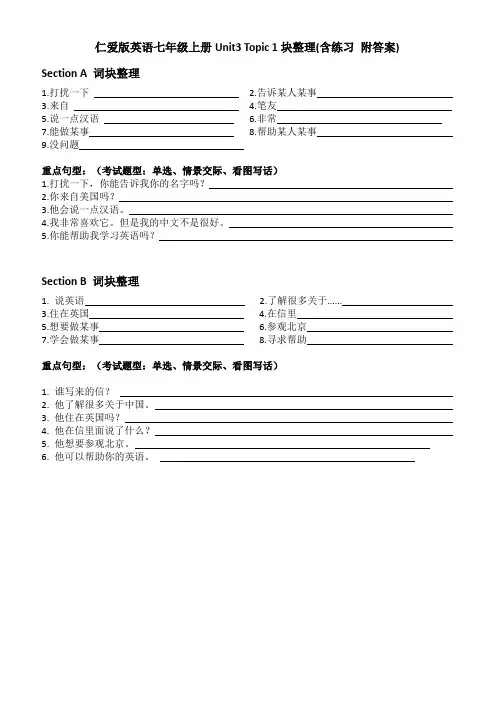
仁爱版英语七年级上册Unit3 Topic 1块整理(含练习附答案) Section A 词块整理1.打扰一下2.告诉某人某事3.来自4.笔友5.说一点汉语6.非常7.能做某事8.帮助某人某事9.没问题重点句型:(考试题型:单选、情景交际、看图写话)1.打扰一下,你能告诉我你的名字吗?2.你来自美国吗?3.他会说一点汉语。
4.我非常喜欢它。
但是我的中文不是很好。
5.你能帮助我学习英语吗?Section B 词块整理1.说英语2.了解很多关于......3.住在英国4.在信里5.想要做某事6.参观北京7.学会做某事8.寻求帮助重点句型:(考试题型:单选、情景交际、看图写话)1.谁写来的信?2.他了解很多关于中国。
3.他住在英国吗?4.他在信里面说了什么?5.他想要参观北京。
6.他可以帮助你的英语。
Section C 词块整理1.新同学2.来自3.很多学生4.非常喜欢....5.一点点喜欢6.一点也不喜欢7.英语说得好8.互相帮助重点句型:(考试题型:单选、情景交际、看图写话)1.我们班的很多同学非常喜欢英语,但是我喜欢它一点点。
2.我们是好朋友并且我们互相帮助。
3.他喜欢汉语吗?4.他一点也不喜欢英语?Section D 词块整理重点句型:(考试题型:单选、情景交际、看图写话)1.你认识他们吗?2.我们非常喜欢他。
3.但是我们不认识她。
语法:人称代词仁爱版英语七年级上册Unit3 Topic 1词块整理答案Section A 词块整理1.打扰一下excuse me2.告诉某人某事tell sb. Sth.3.来自be/come from4.笔友pen pal /friend5.说一点汉语speak some Chinese6.非常very much/a lot7.能/会做某事can do sth. 8.帮助某人某事help sb. do sth.9.没问题no problem重点句型:(考试题型:单选、情景交际、看图写话)1.打扰一下,你能告诉我你的名字吗?Excuse me,could you please tell me your name?2.你来自美国吗?Do you come from American?3.他会说一些汉语。
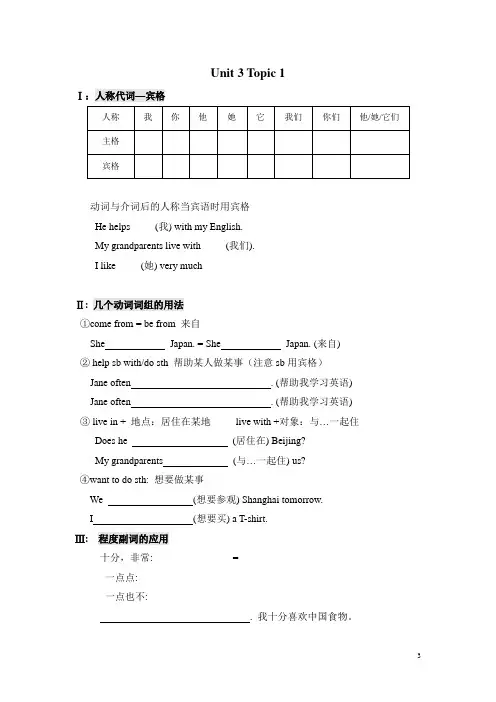
Unit 3 Topic 1Ⅰ:人称代词—宾格动词与介词后的人称当宾语时用宾格He helps ____ (我) with my English.My grandparents live with ____ (我们).I like ____ (她) very muchⅡ: 几个动词词组的用法①come from = be from 来自She Japan. = She Japan. (来自)② help sb with/do sth 帮助某人做某事(注意sb用宾格)Jane often . (帮助我学习英语) Jane often . (帮助我学习英语) ③ live in + 地点:居住在某地live with +对象:与…一起住Does he (居住在) Beijing?My grandparents (与…一起住) us?④want to do sth: 想要做某事We (想要参观) Shanghai tomorrow.I (想要买) a T-shirt.Ⅲ: 程度副词的应用十分,非常: _______________ = _______________一点点: _______________一点也不: _______________. 我十分喜欢中国食物。
. 我喜欢英语一点点。
. 她一点也不喜欢黑色。
Ⅳ:一般现在时态的各种句型(行为动词当谓语时)①肯定句:当主语是非单三时,谓语动词用;We (come) from China.I (like) English very much.主语是单三时,谓语动词用形式,一般情况在动词后+s/es.She often (help) me with my Chinese.Michael (teach) English in China.②否定句:当主语是非单三时,在谓语动词前加;They (not know) me.I (not have) big eyes.当主语是单三时,在谓语动词前加,并还原动词原形.He (not like) English at all.Jane (not live) in Beijing.③一般疑问句:当主语是非单三时,句首用;(do) you have long hair?(do) they speak Japanese?当主语是单三时,句首用,并还原动词原形.(do) she (come) from the USA?(do) he (find) his sister?Topic 1 重点句子综合应用请以My Pen Pal为题写一篇50词左右的短文。
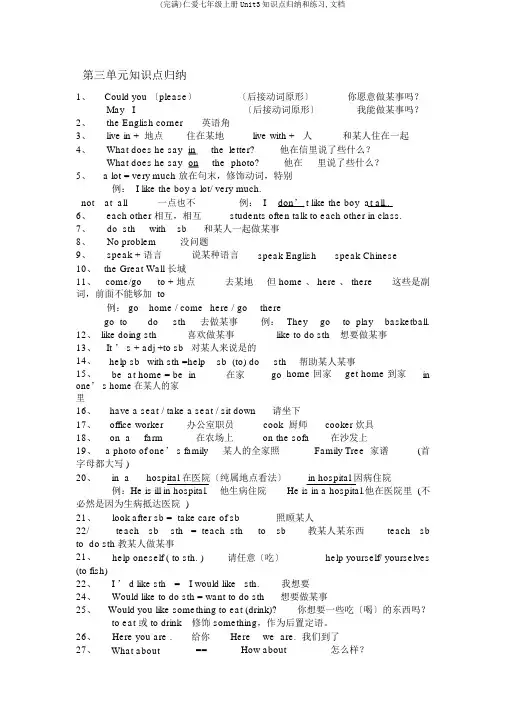
第三单元知识点归纳1、Could you 〔please〕〔后接动词原形〕你愿意做某事吗?May I〔后接动词原形〕我能做某事吗?2、the English corner英语角3、live in + 地点住在某地live with + 人和某人住在一起4、What does he say in the letter?他在信里说了些什么?What does he say on the photo?他在里说了些什么?5、 a lot = very much 放在句末,修饰动词,特别例: I like the boy a lot/ very much.not at all一点也不例: I don’ t like the boy at all..6、each other 相互,相互students often talk to each other in class.7、do sth with sb和某人一起做某事8、No problem没问题9、speak + 语言说某种语言speak English speak Chinese10、the Great Wall 长城11、come/go to + 地点去某地但 home 、 here 、 there这些是副词,前面不能够加 to例: go home / come here / go therego to do sth去做某事例:They go to play basketball.12、 like doing sth喜欢做某事like to do sth想要做某事13、It ’ s + adj +to sb对某人来说是的14、help sb with sth =help sb (to) do sth帮助某人某事15、be at home = be in在家go home 回家get home 到家in one’ s home在某人的家里16、have a seat / take a seat / sit down请坐下17、office worker办公室职员cook厨师cooker 炊具18、on a farm在农场上on the sofa在沙发上19、 a photo of one’ s family某人的全家照Family Tree 家谱(首字母都大写 )20、in a hospital 在医院〔纯属地点看法〕in hospital 因病住院例:He is ill in hospital.他生病住院He is in a hospital.他在医院里 (不必然是因为生病抵达医院 )21、look after sb = take care of sb照顾某人22/teach sb sth= teach sth to sb教某人某东西teach sb to do sth 教某人做某事21、help oneself ( to sth. )请任意〔吃〕help yourself/ yourselves (to fish)22、I ’ d like sth=I would like sth.我想要24、Would like to do sth = want to do sth想要做某事25、Would you like something to eat (drink)?你想要一些吃〔喝〕的东西吗?to eat 或 to drink修饰 something,作为后置定语。


仁爱七年级上册Unit3知识点归纳和练习(2)(word版可编辑修改) 编辑整理:尊敬的读者朋友们:这里是精品文档编辑中心,本文档内容是由我和我的同事精心编辑整理后发布的,发布之前我们对文中内容进行仔细校对,但是难免会有疏漏的地方,但是任然希望(仁爱七年级上册Unit3知识点归纳和练习(2)(word版可编辑修改))的内容能够给您的工作和学习带来便利。
同时也真诚的希望收到您的建议和反馈,这将是我们进步的源泉,前进的动力。
本文可编辑可修改,如果觉得对您有帮助请收藏以便随时查阅,最后祝您生活愉快业绩进步,以下为仁爱七年级上册Unit3知识点归纳和练习(2)(word版可编辑修改)的全部内容。
第三单元知识点归纳1、Could you (please)……(后接动词原形)你愿意做某事吗?May I …… (后接动词原形) 我能做某事吗?2、 the English corner 英语角3、 live in + 地点住在某地 live with + 人和某人住在一起4、 What does he say in the letter? 他在信里说了些什么?What does he say on the photo?他在电话里说了些什么?5、 a lot = very much 放在句末,修饰动词,非常……例: I like the boy a lot/ very much。
not at all 一点也不…… 例: I d on’t like the boy at all。
.6、 each other 相互,彼此 students often talk to each other in class。
7、do sth with sb 和某人一起做某事8、No problem 没问题9、speak + 语言说某种语言 speak English speak Chinese10、 the Great Wall 长城11、come/go to + 地点去某地但home 、here 、 there 这些是副词,前面不能加to例:go home / come here / go therego to do sth 去做某事例:They go to play basketball。
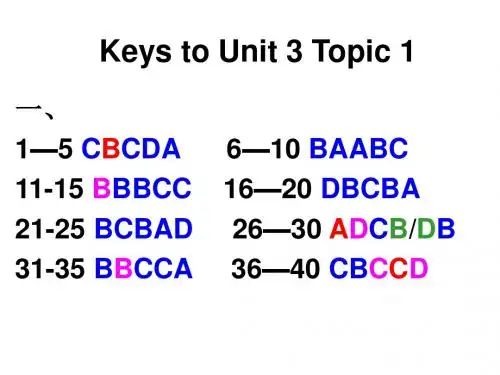
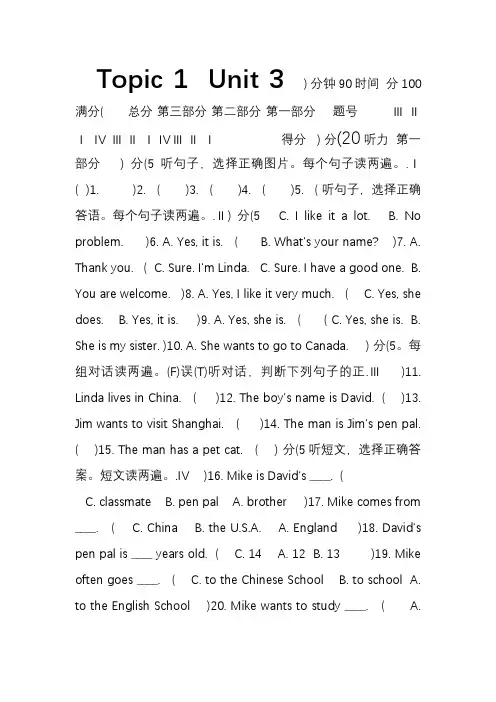
Topic 1 Unit 3 ) 分钟90时间分100满分(总分第三部分第二部分第一部分题号Ⅲ ⅡⅠ Ⅳ Ⅲ Ⅱ Ⅰ ⅣⅢ Ⅱ Ⅰ 得分 ) 分(20听力第一部分) 分(5听句子,选择正确图片。
每个句子读两遍。
.Ⅰ( )1. )2. ( )3. ( )4. ( )5. ( 听句子,选择正确答语。
每个句子读两遍。
.Ⅱ) 分(5 C. I like it a lot. B. No problem. )6. A. Yes, it is. ( B. What’s your name? )7. A. Thank you. ( C. Sure. I’m Linda. C. Sure. I have a good one. B. You are welcome. )8. A. Yes, I like it very much. ( C. Yes, she does. B. Yes, it is. )9. A. Yes, she is. ( ( C. Yes, she is. B. She is my sister. )10. A. She wants to go to Canada. ) 分(5。
每组对话读两遍。
(F)误(T)听对话,判断下列句子的正.Ⅲ )11. Linda lives in China. ( )12. The boy’s name is David. ( )13. Jim wants to visit Shanghai. ( )14. The man is Jim’s pen pal. ( )15. The man has a pet cat. ( ) 分(5听短文,选择正确答案。
短文读两遍。
.Ⅳ )16. Mike is David’s ____. (C. classmate B. pen pal A. brother )17. Mike comes from ____. ( C. China B. the U.S.A. A. England )18. David’s pen pal is ____ years old. ( C. 14 A. 12 B. 13 )19. Mike often goes ____. ( C. to the Chinese School B. to school A. to the English School )20. Mike wants to study ____. ( A.Chinese B. English ) 日语C. Japanese( ) 分(55 基础知识运用第二部分 ) 分(10单项选择。
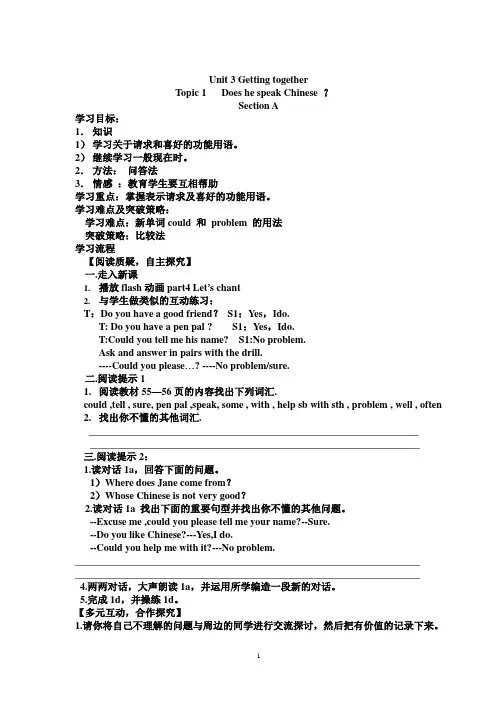
Unit 3 Getting togetherTopic 1 Does he speak Chinese ?Section A学习目标:1.知识1)学习关于请求和喜好的功能用语。
2)继续学习一般现在时。
2.方法:问答法3.情感:教育学生要互相帮助学习重点:掌握表示请求及喜好的功能用语。
学习难点及突破策略:学习难点:新单词could 和problem 的用法突破策略:比较法学习流程【阅读质疑,自主探究】一.走入新课1.播放flash动画part4 Let’s chant2.与学生做类似的互动练习:T:Do you have a good friend?S1:Yes,Ido.T: Do you have a pen pal ? S1:Yes,Ido.T:Could you tell me his name? S1:No problem.Ask and answer in pairs with the drill.----Could you please…? ----No problem/sure.二.阅读提示11.阅读教材55—56页的内容找出下列词汇.could ,tell , sure, pen pal ,speak, some , with , help sb with sth , problem , well , often 2.找出你不懂的其他词汇.____________________________________________________________________________________________________________________________________三.阅读提示2:1.读对话1a,回答下面的问题。
1)Where does Jane come from?2)Whose Chinese is not very good?2.读对话1a 找出下面的重要句型并找出你不懂的其他问题。
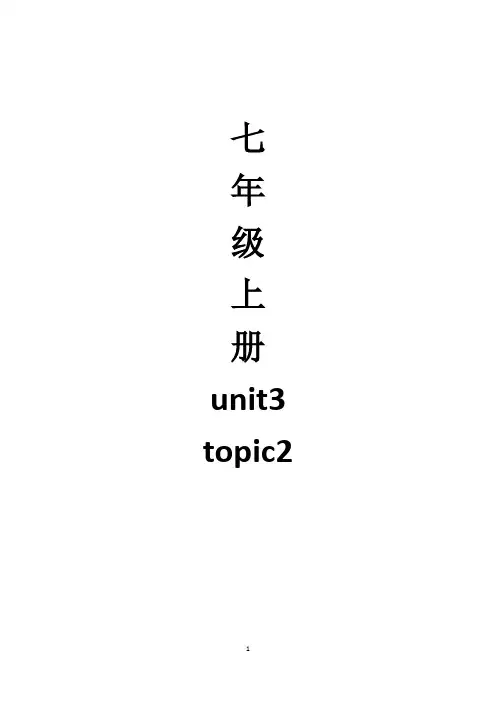
七年级上册unit3 topic2重点词组in a school在学校in a hospita在医院in an office在办公室in a shop / store 在商店on a farm 在农场be home到家make oneself at home 请随意,别拘束。
have a seat.= sit down= take a seat.请坐.a photo of my family一张我家的相片the young woman in yellow穿黄衣服的年轻女士on the sofa 在沙发上a happy family 幸福的家a student in Grade Seven一名七年级的学生live in…居住在live with…和……住在一起look after…照顾……; 保管……重点句型⒈提问职业:⑴.What do you do? I am a doctor.⑵.What does he "she do? He "She is a doctor.⒉提问工作场所:⑴. Where do you work?I work in a hospital"school⑵.Where does he "she work ?He"She works in an office"on a farm.重点语言点1.I’m home 我到家了be at home=be in在家go home 回家2.句型:一般现在时含有助动词do/does的特殊疑问句(询问职业)What do/does +主语+do? = What +be+主语?=Whats ones job?答语:人称代词主格+be+职业3.构词法:某些动词或名词之后+er则变成从事这一工作的人work—worker farm--farmer (注意:cook 厨师cooker厨具) 练习:Work farm teach Michael1. His father works in a school,he is a _________.2.This is ________mother.3.A ________works on a farm.5.May's brother is a __________ in a factory4.在医院,学校,办公室用介词in,在农场则用介词onin a school/a hospital/an office on a farm5.句型:一般现在时含有助动词do/does的特殊疑问句,询问职业及工作场所What do/does …do? Where do/does …work?练习1.Where does your mother work?--In a h______,she is a nurse.2.My mother works in a school .She is a _____3.—What do they do? They are farmers and work on a f______.4.Office workers often w______ in the office5.---What does her p_______ do?---Oh,her father is a cook,her mother is a worker.6.辨析:in the hospital, in hospitalin the hospital 表示“在医院”,指地点概念。
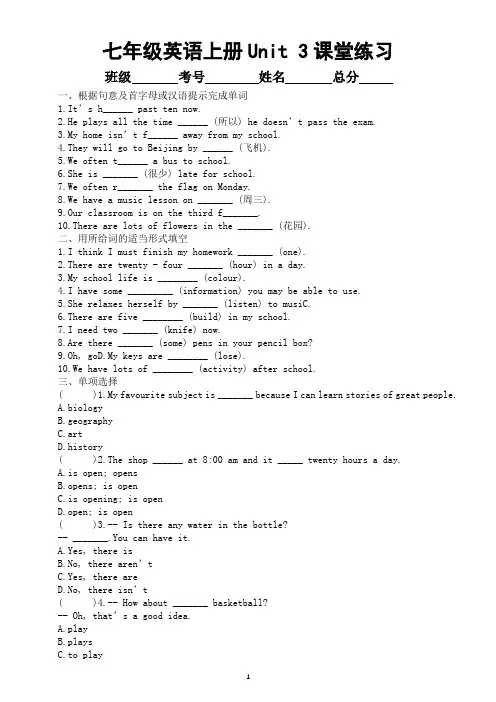
七年级英语上册Unit 3课堂练习班级考号姓名总分一、根据句意及首字母或汉语提示完成单词1.It’s h______ past ten now.2.He plays all the time ______ (所以) he doesn’t pass the exam.3.My home isn’t f______ away from my school.4.They will go to Beijing by ______ (飞机).5.We often t______ a bus to school.6.She is _______ (很少) late for school.7.We often r_______ the flag on Monday.8.We have a music lesson on _______ (周三).9.Our classroom is on the third f_______.10.There are lots of flowers in the _______ (花园).二、用所给词的适当形式填空1.I think I must finish my homework _______ (one).2.There are twenty - four _______ (hour) in a day.3.My school life is ________ (colour).4.I have some _________ (information) you may be able to use.5.She relaxes herself by _______ (listen) to musiC.6.There are five ________ (build) in my school.7.I need two _______ (knife) now.8.Are there _______ (some) pens in your pencil box?9.Oh, goD.My keys are ________ (lose).10.We have lots of ________ (activity) after school.三、单项选择( )1.My favourite subject is _______ because I can learn stories of great people.A.biologyB.geographyC.artD.history( )2.The shop ______ at 8:00 am and it _____ twenty hours a day.A.is open; opensB.opens; is openC.is opening; is openD.open; is open( )3.-- Is there any water in the bottle?-- _______.You can have it.A.Yes, there isB.No, there aren’tC.Yes, there areD.No, there isn’t( )4.-- How about _______ basketball?-- Oh, that’s a good idea.A.playB.playsD.playing( )5.She wants to go to school by _____ subway but her mother wants her to take ____ bus.A./; /B./; aC.a; aD.a; /( )6.Can you see the book on the desk? Please _______.A.give it to meB.give me itC.give them to meD.give me them( )7.My brother wants to ______ the Amy next year.A.take part inB.join inC.joinD.take part( )8.If you have any questions, you can ______ your hanD.A.riseB.raiseC.ariseD.to raise( )9.The boss makes the workers ______ all the time.A.workB.worksC.to workingD.to work( )10.-- Are those your books?-- _______.The y are Tom’s.A.Yes, it isB.No, it isn’tC.Yes, they areD.No, they aren’t( )11.There aren’t ______ pencils in his bag.A.someB.anyC.muchD.no( )12.You can ______ your books in the Lost and Found Office.A.look forB.find outC.findD.look( )13.-- ______ do you leave for Beijing?-- ____ Monday.A.What time; InB.What time; OnD.When; On( )14.It’s time ______ us ______ English lesson.A.for; to haveB.for; haveC.of; to haveD.of; have( )15.She often goes home _____ her friends.A.andB.butC.soD.with四、翻译句子1.我通常六点半吃完饭。
Unit3 Topic3 SectionD 精品学案课型:复习课课时:1课时主备人:一、学习目标:知识与技能(1)词汇:学习一些单词和短语。
(2)复习含有would like表达就餐意愿的表达法,能够运用常用的就餐用语。
(3) 复习why not/ why don’t you 提建议的方法。
(4) 掌握和了解一些在餐厅用餐的语言表达。
二、过程与方法:课前做好预习,根据音标特点记忆单词,在小组活动中练习对话内容,通过听说练习加强对知识点的掌握。
三、情感态度价值观:通过活动的实施,同学们能学会如何招待客人,如何在餐馆用餐;培养和谐,默1契的情感。
四、学习重点:能掌握含有would like表达就餐意愿的表达法。
能掌握提建议的几种表达方法。
五、学习难点:能够运用常用的就餐用语。
提建议的几种表达法之间的相互转。
I. 课前自主预习案一.过词汇、短语关:1.试拼读136页P77的新单词,小组内相互拼读。
2.在家听写P77单词。
3.翻译下列短语和重点句型并在课文中划出。
1) be kind to sb _______________ 2) be glad to do sth _____________3) have dinner with sb.__________ 4) take one’s order ______________5)I’m in China now.____________________6)I have many friends here.________________________________7)They are all kind to me._________________________________8)I’m very glad to be here._________________________________2二、请写出在预习中自己认为难读的单词、短语或其他,明天在学校问同学或老师。
Unit 3 Getting Together Topic 1 Does he speak Chinese?Section D 【学习目标】1、学习的任务和目标:1.知识1)继续复习一般现在时。
2)复习人称代词的用法2.方法:对话法练习一般现在时的构成3.情感通过描述个人的喜好教育学生要热爱生活。
2、学习的重点:一般现在时和人称代词的用法。
3、学习的难点:一般现在时和人称代词的用法。
【学习过程】Step 1: 自主学习----明确目标自学文本1. 请同学们课前上平台阅读思考本节导学案,明确本节课的学习任务和目标。
2. 对照课本后面第三单元的单词表跟读单词录音。
要求:根据录音及单词音标,首先会读单词接着边读边写记单词,注意中英文的转换,最后默写单词。
3. 独立认真地预习课文。
要求:阅读课文,把不理解的短语,句子用红笔做上记号。
4. 在线上对照导学案本课时完成探究归纳部分的预习。
5. 请大家带着问题自学本课时的两个微课视频。
Step 2: 自学检测----在线测学质疑思学1. 学生独立完成导学案上的自学检测。
2. 学生在线上提交客观题的答案。
3. 对照正确的答案对错题进行反思,质疑。
1. 通过自学完成下列任务:自学检测题一. 根据句意及汉语提示完成句子1. Many (人们) from China can speak English well now.2. Tony often (朗读)books in the morning.3. I have many friends, and (每个)friend is very good.4. We are happy each (一天).5. Carla likes China very much. She wants to (参观) her.二. 单项选择( ) 1. — Lisa is a nice girl.— Yes. And often helps with my English.A. She; IB. her; meC. she; meD. hers; my ( ) 2. — Are Michael and Kangkang in the same grade?— Yes. But are in different classes.A. themB. theirC. weD. they( ) 3. — Zhang Ming speak English?— No, he .A. Is; isn’tB. Does; doesn’tC. Do; don’tD. Are; ar en’t ( ) 4. — Can you help me carry(搬)these books?—A. That’s right.B. That’s OK.C. That’s all right.D. No problem. ( ) 5. —What’s her sisters name?—name is Lucy.A. HerB. She’sC. SheD. Hers【知识探究】知识点一1.人称代词用法口诀:人称代词分两格,主格宾格来分说;主格定把主语作,宾格作宾不会错。
2024-2025学年七年级上期中考点大串讲(仁爱科普版)专题03 词汇,短语,句型分类归纳Unit 3 Our Colorful School Life科目_____________ 语文 _____________ 数学 _____________ 英语 _____________ 地理 _____________ 生物 _____________ 历史 _____________ 美术 _____________计算机科学 __________________________周;一周 _____________ 星期一 _____________ 星期二 _____________ 星期三 _____________ 星期四 _____________ 星期五 _____________ 星期六 _____________ 星期日 _____________(表示整点)……点钟 _____________ 一半 _____________在……之后;过去 _____________ 一刻钟;四分之一 _____________ 现在 _____________ 上午,午前 _____________ 下午,午后 _____________ 在……期间 _____________总是 _____________ 通常地 _____________时常;往往 _____________ 有时 _____________不常,很少_____________从不_____________(表示方式);(表示实施者)_____________乘坐;带去;携带_____________地铁_____________飞机_____________火车_____________大船_____________小船_____________小汽车_____________图书馆_____________建筑物;楼房_____________操场_____________楼层;地板_____________花园_____________礼堂;大厅_____________教室_____________黑板_____________书桌_____________椅子_____________铅笔_____________直尺_____________书包_____________开始_____________开始;开头_____________停止_____________结束;终止_____________来;来到_____________开门;打开;张开_____________放;安置_____________浇水_____________提升;举起;筹集_____________使成为;使得;做_____________询问;请求_____________回答;答复_____________找到;发现_____________学习;记住_____________参加;加入_____________想要;需要_____________为……着色_____________生活;生命___________(pl. ___________)方式;方面;路_____________俱乐部;社团_____________歌曲_____________参与;部分_____________游戏;比赛_____________乐趣_____________旗帜;旗_____________手;帮助_____________问题_____________美国人_____________国家_____________城市_____________房间_____________刀_____________(pl. _____________)盒;箱;方框_____________瓶子_____________玻璃杯;眼镜_____________菜肴;餐具_____________番茄_____________果汁_____________水_____________花朵_____________球_____________颜色_____________网页_____________丰富多彩的_____________特别受喜爱的_____________受欢迎的_____________更多的_____________整洁的_____________有趣的_____________有趣的;有吸引力的_____________国家的;民族的_____________美国的_____________丢失的;迷路的_____________第一;首先_____________因为_____________结束;遍及;在……上面_____________在……附近_____________紧挨着的;下一个的_____________任何的,任一的_____________出来;在外面_____________________ Thursday afternoon 在星期四下午_____ the morning _____ every Monday 在每个星期一的早上___________ the ___________ 在白天______________________ 结束______________________ 在……的开始______________________ 在操上be _____ the music class 在上音乐课_____/_____ the club 在社团____________________ ... ……的方式_____ underground (介词短语)坐地铁__________underground (动词短语)坐地铁____________________ 步行_________________... 离……很远;远离……_________________ 紧邻____________________… ……的历史____________________ 校园生活____________________ 告诉(某人)有关……的情况____________________ 上演,上映__________ the national flag 升国旗__________PE classes 上体育课__________ one’s hand 举手____________________ 回答问题____________________ 下课后____________________ 放学后____________________ 在课上_______________ do 想要做某事__________ part _____ 参加__________ to do sth. 学习做某事__________ the club 加入社团____________________ 照相____________________ 做运动go ____________________ 去图书馆____________________ 找出,查找____________________ 知道,了解have ____________________ 玩得开心_______________ is it now?/ __________ the time? 现在几点了?It’s eight o’clock. 现在是8点钟。
Review of unit 3 topic 2What does your mother doClass______ Name ___________Words:1.4.7.10.13.16.________n.树17._________ adj.得意的;机灵的18._______ n. 儿子19.________ v./n. 爱,喜欢Phrases:1.到家______________2.很快乐做某事______________3. 一名办公室职员_____________4.姓名_____________5.在农场上____________6.一张......的照片____________7. 给某人看某物______________ ____________ 8.在医院________9.在餐馆______________ 10. 在学校________11. 在农场上________ 12. 在一个办公室里________ Expressions:1.妈妈,我回来了。
_______________________________2.—很快乐见到你。
—我也是。
_________________________________________3.—你妈妈是干什么的?________________________________—她是教师。
__________________________________4.—你父母是做什么的?__________________________________—他们是办公室职员。
_______________________________5.—她在哪里工作?_______________________________—她在医院工作。
___________________________6.—他在哪里工作?____________________________—他在餐馆工作。
Unit 3 Topic 1Ⅰ:人称代词—宾格动词与介词后的人称当宾语时用宾格He helps ____ (我) with my English.My grandparents live with ____ (我们).I like ____ (她) very muchⅡ: 几个动词词组的用法①come from = be from 来自She Japan. = She Japan. (来自)② help sb with/do sth 帮助某人做某事(注意sb用宾格)Jane often . (帮助我学习英语) Jane often . (帮助我学习英语) ③ live in + 地点:居住在某地live with +对象:与…一起住Does he (居住在) Beijing?My grandparents (与…一起住) us?④want to do sth: 想要做某事We (想要参观) Shanghai tomorrow.I (想要买) a T-shirt.Ⅲ: 程度副词的应用十分,非常: _______________ = _______________一点点: _______________一点也不: _______________. 我十分喜欢中国食物。
. 我喜欢英语一点点。
. 她一点也不喜欢黑色。
Ⅳ:一般现在时态的各种句型(行为动词当谓语时)①肯定句:当主语是非单三时,谓语动词用;We (come) from China.I (like) English very much.主语是单三时,谓语动词用形式,一般情况在动词后+s/es.She often (help) me with my Chinese.Michael (teach) English in China.②否定句:当主语是非单三时,在谓语动词前加;They (not know) me.I (not have) big eyes.当主语是单三时,在谓语动词前加,并还原动词原形.He (not like) English at all.Jane (not live) in Beijing.③一般疑问句:当主语是非单三时,句首用;(do) you have long hair?(do) they speak Japanese?当主语是单三时,句首用,并还原动词原形.(do) she (come) from the USA?(do) he (find) his sister?Topic 1 重点句子综合应用请以My Pen Pal为题写一篇50词左右的短文。
可以从下面几个方面来写:1.名叫Jack,13岁,来自美国,现居住在北京;2.会讲一些中文,非常喜欢中国;3.想要参观长城(the Great Wall);4.经常帮助我学习英文;5.我们互相帮助,我们是好朋友。
My Pen Pal_____________________________________________________________________ _____________________________________________________________________ _____________________________________________________________________ _____________________________________________________________________ _____________________________________________________________________Unit 3 Topic 2Ⅰ:名词所有格of (中英文颠倒)我家的一张照片一张中国地图Ⅱ: 后置定语(复习)介词短语可以充当后置定语,位于所修饰名词的后面Who’s the? 穿黄色衣服的那位年轻妇女是谁?Is your uncle? 在沙发上的那个男人是你的叔叔吗?The girl___________________ is my sister.在我旁边的那个是女是我的妹妹。
Ⅲ: 动词转化为名词部分动词在后面+er/r/or,则变成名词work→工人teach→教师farm→农民drive→司机act→演员cook→厨师Ⅳ. 问与答句子1.询问工作:What do / does + 主语+ do? 主语+ be + 工作名称。
①?——.你是做什么的?我是一名学生。
②? ——.你父母是做什么的?他们是工人。
③? ——.他是做什么的?他是一名医生。
④? ——.这个女孩是做什么的?她是一个老师。
2.询问工作地点:Where do / does + 主语+ work? 主语+ work(s) + 地点。
①? ——.你在哪里工作?我在学校工作。
②? ——.他们在哪里工作?他们在农场工作。
③? ——.她在哪里工作?她在办公室工作。
④? ——.你叔叔在哪里工作?他在医院工作。
⑤? ——.你在哪里工作?我在学校教书。
3. 延伸:含有动词的特殊疑问句句(一般现在时态):疑问词+ do / does + 主语+ 动词原形+ ...?①? 你们住在哪里?(live)②? 他来自哪里?(come from)③? 你是怎么拼写它的?(spell)④? 你喜欢什么颜色?(like)Topic 2 重点句子综合应用假如你是Tom,写一篇以My Family为题的60词左右的短文。
根据下面几个方面来写:1.有一个快乐的大家庭,来自美国,现在居住在北京;2.父亲在西餐馆(western restaurant)工作,是一名厨师;3.母亲是一名老师,在北京国际学校教英语;4.哥哥是司机,在北京开出租(taxi);5.我们非常喜欢中国。
My Family__________________________________________________________________________________________________________________________________________ _____________________________________________________________________ _____________________________________________________________________ _____________________________________________________________________ _____________________________________________________________________Unit 3 Topic3Ⅰ:掌握以下短语请随便吃(喝)吃早餐吃午餐吃晚餐吃饭下馆子为你点餐…怎么样为什么不好主意对...友好1. Please (请随便吃) to some fish, Jim.2. Please (请随便喝) to some juice, kids.3. I often (吃午饭) at 12:00.4. Maria often (下馆子) with her parents.5. My classmates (对我友好).Ⅱ: 认识不可数名词肉类:meat, fish, chicken, bread…液体:water, milk, juice…颗粒状:rice, salt…Ⅲ: 问与答句子一:would like 在各种句型中应用1.陈述句:would like sth:想要某物= want sth:想要某物①I would like (一个汉堡).would like to do sth:想要做某事= want to do sth:想要做某事②I would like (吃一个汉堡).2. 一般疑问句:- Would you like sth? 你想要...吗?- Yes, please. No, thanks. - Would you like to do sth? 你想要做...吗?- Yes, I’d like/love to.①? ——.你想要一个鸡蛋吗?不,谢谢。
②? ——.你想要喝牛奶吗?是的,我要。
③? ——.你想要一些喝的东西吗?是的。
④? ——.你想要和我一起吃个饭吗?不,谢谢。
3. 特殊疑问句:What would you like to do? 你想要做什么?①? ——.你想要吃什么?我想要吃一个汉堡。
②? ——.你想要喝什么?我想要喝些水。
二:询问三餐吃什么?What do you usually have for your breakfast / lunch / dinner?I usually have + 食物.三:表示咨询建议的句子:1. Why not do sth? 为什么不....? (回答一般用Good idea)①? ——.为什么不和我一起下馆子呢?好注意。
2. What / How about sth / doing sth? ...怎么样?(回答可用Good idea / All right)②? ——.来些蔬菜怎么样?好吧。
Topic 3 重点句子综合应用Kate来自美国, 现在与父母一起居住在中国。
请结合下表介绍一下她的饮食爱好以及三餐的吃饭地点。
不少于60个词(其中“√”表示喜欢吃的食物,“×”表示不喜欢吃的食物)。
_____________________________________________________________________ _____________________________________________________________________ _____________________________________________________________________ _____________________________________________________________________ _____________________________________________________________________ _____________________________________________________________________答案Unit 3 Topic 1Ⅰ:人称代词—宾格动词与介词后的人称当宾语时用宾格He helps me_ (我) with my English.My grandparents live with _us_ (我们).I like _her_ (她) very muchⅡ: 几个动词词组的用法①come from = be from 来自She is from Japan. = She comes from Japan. (来自)② help sb with/do sth 帮助某人做某事(注意sb用宾格)Jane often helps me with English . (帮助我学习英语)Jane often helps me study English . (帮助我学习英语)③ live in + 地点:居住在某地live with +对象:与…一起住Does he live in (居住在) Beijing?My grandparents live with (与…一起住) us?④want to do sth: 想要做某事We want to visit (想要参观) Shanghai tomorrow.I want to buy (想要买) a T-shirt.Ⅲ: 程度副词的应用十分,非常: very much_ = __a lot__一点点: _a little__一点也不: __not ...at all_I like Chinese food very much . 我十分喜欢中国食物。